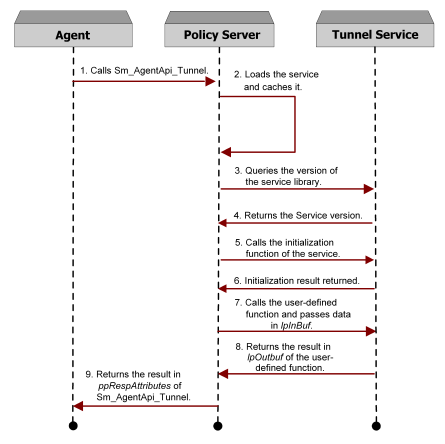

This section contains the following topics:
Develop a Custom Tunnel Service
The Tunnel Service API provides secure transfer of data between an agent and a shared library that supports the Tunnel Service.
When an agent sends a tunnel request to the Policy Server, the request contains:
The Policy Server initializes the appropriate service, invokes the requested function, and passes the data to the function. Once the service has performed its task, the Policy Server returns the results to the agent. The following graphic shows how the API is used in the tunnel service process:

Each tunnel service is an instance of a shared library that supports the Tunnel Service API. To support a tunnel service, you must build a new shared library.
Install the shared library in one of the following locations:
To develop a tunnel service, include the SmApi.h header file:
#include "SmApi.h"
The shared library must provide the following functions as externally visible entry points:
|
Function |
Description |
|---|---|
|
Requests the Tunnel Service API version that the custom library is compliant with. |
|
|
Initializes the tunnel service. |
|
|
Releases the tunnel service. |
|
|
Calls the function that the tunnel agent is requesting. |
Each entry point in the shared library must be defined according to specified syntax.
Note: If you are using Microsoft Visual Studio, export the function addresses to a modular definition file (.DEF) file. To export the function addresses, create a .DEF file, and in the export section of the .DEF file, list all of the tunnel service functions, described in the previous table. Once you have created the .DEF file, add it to the Microsoft Visual Studio project.
SiteMinder calls this function to request the Tunnel Service API version that the custom library is compliant with.
Syntax
int SM_EXTERN SmQueryVersion ( const Sm_Api_Context_t* lpApiContext );
|
Parameter |
I/O |
Description |
|---|---|---|
|
lpApiContext |
I |
A pointer to the API context structure. |
Returns
Returns the version number of the Tunnel Service API. Currently the versions supported are Sm_Api_Version_V4 and Sm_Api_Version_V4_1. Version constants are defined in SmApi.h.
SiteMinder calls this function so that a tunnel service can perform its own initialization procedure. This call is made once when the tunnel service is loaded for the first time. The information is cached for subsequent use.
Syntax
int SM_EXTERN SmTunnelInit ( void** ppServiceHandle, const Sm_Api_Context_t* lpApiContext, const int nBytesStatusBuf, char* lpszStatusBuf );
|
Parameter |
I/O |
Description |
|---|---|---|
|
ppServiceHandle |
I |
An internal pointer used by the tunnel service library. |
|
lpApiContext |
I |
A pointer to the API context structure. |
|
nBytesStatusBuf |
O |
Maximum size of the output status buffer. |
|
lpszStatusBuf |
O |
Output buffer receives any status messages from the tunnel service. |
Returns
Returns 0 if successful or -1 if unsuccessful.
SiteMinder calls this function so that a tunnel service can perform its own rundown procedure. This call is made once when SiteMinder is shutting down.
Syntax
void SM_EXTERN SmTunnelRelease ( void* pServiceHandle, const Sm_Api_Context_t* lpApiContext );
|
Parameter |
I/O |
Description |
|---|---|---|
|
pServiceHandle |
I |
An internal pointer used by the tunnel service library. |
|
lpApiContext |
I |
A pointer to the API context structure. |
SiteMinder calls the function requested by the tunnel agent.
Syntax
int SM_EXTERN <func-spec> ( void* pServiceHandle, const Sm_Api_Context_t* lpApiContext, const Sm_Api_RequestContext_t* lpReqContext, const Sm_Api_TunnelContext_t* lpTunnelContext, const int nBytesInBuf, void* lpInBuf, const int nBytesOutBuf, void* lpOutBuf, const int nBytesStatusBuf, char* lpszStatusBuf );
|
Parameter |
I/O |
Description |
|---|---|---|
|
pServiceHandle |
I |
An internal pointer used by the tunnel service library. |
|
lpApiContext |
I |
A pointer to the API context structure. |
|
lpReqContext |
I |
A pointer to the API request structure. |
|
lpTunnelContext |
I |
A pointer to the API tunnel context. |
|
nBytesInBuf |
I |
Number of bytes in the input buffer. |
|
lpInBuf |
I |
Input buffer containing information sent from the remote agent. |
|
nBytesOutBuf |
O |
Maximum size of the output result buffer. |
|
lpOutBuf |
O |
Output buffer to receive the result. |
|
nBytesStatusBuf |
O |
Maximum size of the status buffer. |
|
lpszStatusBuf |
O |
Status buffer to receive status. |
|
Copyright © 2013 CA.
All rights reserved.
|
|